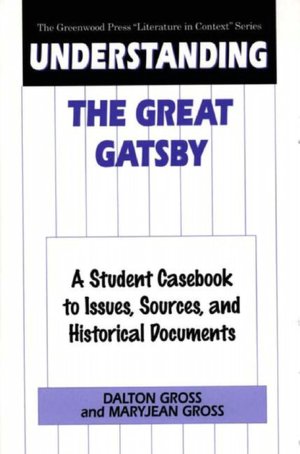 |
| *The Great Gatsby cover |
This is an article on a website put out by Cornell University. The article is a short analysis of Gatsby along with commentary about the Fitzgerald's intentions for penning the novel. The article was not the only reason I chose this site. Also on this site are a multitude of other resources surrounding The Great Gatsby, The Jazz Age, and F. Scott Fitzgerald. It includes links to other websites, e-books, trade book citations, audio books, and book reviews. It also includes other articles within the site that highlight the novel, the characters, and the author. This website is not only a great resource but serves as a library for other resources.
In order to use this website to the fullest extent I believe it would be beneficial to have either a web quest on this site or a website navigation guide. I think the site is going to help students identify important themes in the novel as well as surrounding the novel.
McCall, D. (n.d.). On The Great Gatsby. Retrieved from http://reading.cornell.edu/reading_project_06/gatsby/the_great_gatsby.htm
 |
| * Understanding The Great Gatsby... |
Written by Dalton Gross and Maryjean Gross, it offers a collection of primary sources, including newspaper articles, first-person accounts, and testimonies. These sources help to put The Great Gatsby into historical, social, and cultural context. It includes chapters on the 1920s concerning money and women. It also includes literary analysis of the book. This book has a Lexile rating of 1240 and is appropriate for 11th graders. Not only that, but it is particularly written for students who may need more context for understanding the atmosphere in which the novel was written and ways of approaching the novel.
I would probably buy the book on my own and then choose three or four chapters and split the class into groups. Each group is responsible for being the expert on their own chapter. They will give a presentation closer to the end of the unit about their chapter and how it helps them to understand The Great Gatsby.
Gross, D & Gross, M. (1998).Understanding The Great Gatsby: A student casebook to issues, sources, and historical documents. Westport, CT: Greenwood Publishing Group, Inc.
 |
| *What Makes This Gatsby Guy So Great? |
Found on shmoop.com, a website that made specifically for students, is a short power-point video with voice-over about the Great Gatsby (Jay Gatz). It discusses why Gatsby is "great." Analyzing Fitzgerald's style and development of Gatsby as a character, it comes to the conclusion that he is great not because of his fame or new-founded wealth but because of his dream, his cause. Jay Gatz became Gatsby because he wanted to impress and win back the heart of Daisy Buchanan. He molded himself into a legend for love. While many feel this may not be a good reason, it is still a reason that most people can understand.
There was no particulars on where the power-point originated so I cited the webpage and credited the Shmoop Editors:
Shmoop Editorial Team. (November 11, 2008).The Great Gatsby. Retrieved October 19, 2012, from http://www.shmoop.com/great-gatsby/
Article: "The Great Gatsby" from The Encyclopedia of a Novel
 |
| *Daisy and Gatsby (L. Dicaprio, C. Mulligan) |
This article, in a reference book, highlights Fitzgerald's goals, the background of the times, summarizes and comments on the story, itself, and provides a few examples of strong symbolism. It is not too long or drawn out and provides some complex vocabulary for studying. Also - it serves as excellent commentary on The Great Gatsby, bringing together highlights of Fitzgerald's life and the 1920s, as well as highlights from the novel. It also cites the effects that the novel had on other writers and novels at the time. Most importantly, it claims there are two important stories here - remaking oneself to attain love (the main story), and a commentary by Fitzgerald on the American Dream.
While there are some complex words in the text I believe it would serve well as a DRTA. It is short enough to read during a class period and has some good vocabulary to highlight beforehand.
Mangum, B. (1998). "The Great Gatsby." In Paul Schellinger (Ed.), Encyclopedia of the novel (pp. 514-515). Chicago, IL: Fitzroy-Dearborn, 1998, pp. 514-515.
Nice job on your blog ! I particularly like the way you incorporated some student driven projects - like the "schmoop" page. I am also enjoying reading your detailed commentaries.
ReplyDeleteThanks. A student driven website is also in a previous post. While they aren't classically used in the study of novels I think students today need to have the opportunity to relate to literature with their own interests and in their own ways.
DeleteHey Kelly! I loved the Schmoop video. High school students will definitely like the comical vibe from the video, and I think this might help them enjoy reading the book a lot! The notes underneath the video also helped me look at the storyline more closely and also helped with my own personal understanding of the book.
ReplyDeleteI enjoyed the video as well - schmoop is also helpful. While it is like spark-notes it gets more into the "why" of the book.
DeleteThanks for your help in class. The Great Gatsby: Wow! What an awesome choice to build a unit around. I just ordered it on Amazon. I also never knew there was a film. After I read the book, I'll put it on my Netflix.
ReplyDeleteActually the new film - with Leonardo DiCaprio is coming out in 2013. There are some older films as well though I am excited about the new one - it looks interesting.
Delete